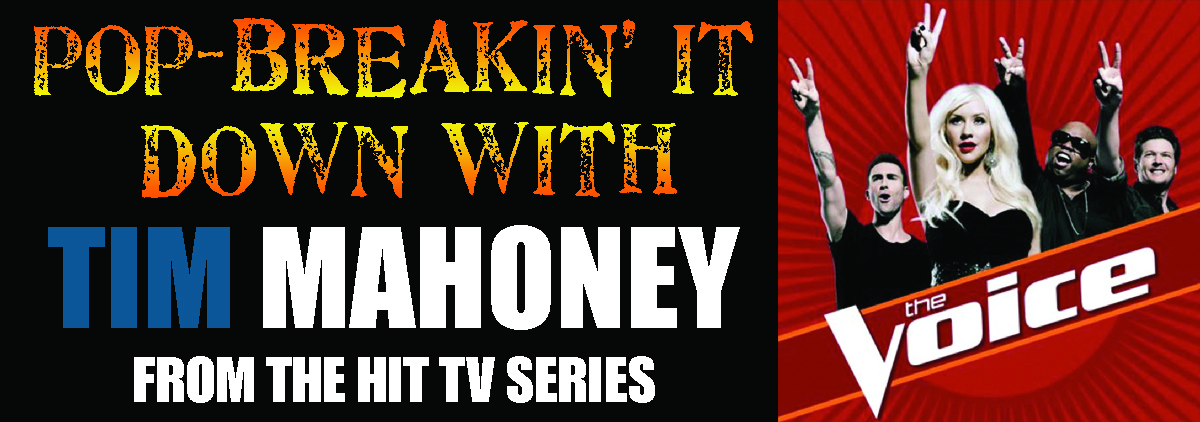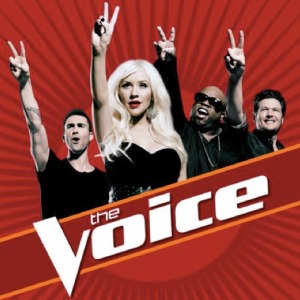brent johnson chats with Tim Mahoney, a contestant on NBC’s hit music competition The Voice …
Tim Mahoney has sweated on stages for 15 years. He’s released more than a half-dozen albums. He’s attracted a following throughout his native Midwest.
But the 39-year-old singer-songwriter got an unexpected piece of publicity recently — when Maroon 5’s frontman mistook him for a woman.
Mahoney enjoyed a major career boost as one of the contestants on the first season of The Voice, NBC’s quirky singing competition. The premise: Contestants audition by singing to the backs of four celebrity judges — Adam Levine, Cee-Lo, Christina Aguilera and Blake Shelton — who then turn around if they’re impressed by the vocals.
Levine was surprised when he swiveled his chair as Mahoney belted out a rendition of Sam Cooke’s ‘Bring It On Home To Me.’
“Don’t be insulted by this,” the Maroon 5 singer said. “I thought you were a chick. I thought you were gonna be a girl when I turned around. I’ve heard that about my voice a lot. And clearly, you are not a woman.”
http://www.youtube.com/watch?v=2S-liQxPeJI
Mahoney didn’t mind. After years of toiling in the music industry, he’s happy that his music — a mix of rock and soul anchored by his pretty but gritty voice — is finally getting some national press.
The Minneapolis native was recently eliminated from the show, but Pop-Break’s Brent Johnson spoke with him about his big break and the road it took to get there …
Pop-Break: You’re from Minneapolis. Which is an underrated music scene — home of Prince and The Replacements.
Tim Mahoney: There just hasn’t been anything really big of late. Yes, Prince, The Replacements, Semisonic, Soul Asylum. But I’m hoping Tim Mahoney is the next biggest thing.
PB: How long have you been making music?
TM: I’ve been doing it for a living for about 15 years, touring around the Midwest. I’ve got about eight records out. All the records have been independent. It’s been real good. It’s something where I’m always trying to get something to break out of that Midwest scene.
In 2007, I was in Rolling Stone magazine — a two-page spread. I thought it was going to be the biggest thing ever. It turned out that it really wasn’t.
PB: So how did you get involved with The Voice?
TM: I tried out for a show called Rock Star: INXS. I almost made it on that show. The casting director said, ‘I’ll keep you in mind.’ So, five years later, she said, ‘I’ve got a new show. You should try out. I think you’ll like the format.’
I came out. I was a little leery at first. I though, ‘Well, whatever, we’ll see what happens.’ My main goal with these things is to get some TV time. And although I wasn’t happy I was cut, and didn’t think I should have been, I was happy to at least get the exposure I got.
PB: Who are your influences?
TM: Definitely I would say U2. In middle school, probably the record The Unforgettable Fire. But also soul music. Sam Cooke was a big inspiration.
PB: So you were in Rolling Stone in 2007. Were you one of their Artists To Watch?
TM: No. That probably would have been better [laughs]. I won another contest, with Ray-Ban. We got to play the Hard Rock. And we got to do a photo shoot and an interview. It was essentially an ad. One side was a picture of me, and the other side was an ad with an interview. But it was even in the 40th anniversary issue. Regardless, it’s been a really good PR tool. People kind of see it and go, ‘Wow, that’s a big deal.’ But then I explain it to them that when it happened, I don’t know, it just didn’t resonate.
PB: But that’s the music business. Just an up-and-down thing.
TM: My story, I can’t complain a lot. Because in the Midwest, you make a good living. We’ve got a lot of fans here. But it is also tough to break across that cusp of going from a Midwest artist to a national artist.

PB: Actually getting to finally be on TV, how did it feel?
TM: The truth is, when you’re doing that stuff, you’re taping it. It was probably more nerve-wracking being there for the whole time before the TV taping, because you’re constantly on edge. ‘Am I staying? Am I going?’ When we finally got to the taping, I felt that part wasn’t as nerve-wracking, because it was just like a show to me. Here’s 500 people — we’re gonna do a show. It didn’t feel like 15 million people watching. What was nerve-wracking was watching it air.
PB: Where did you watch it?
TM: I actually had a couple of viewing parties for the first two Tuesdays with fans and friends at a music club here in Minneapolis.

PB: How odd was it to sing to the backs of music stars?
TM: As contestants, we talked to each other — ‘When do you think your chair is going to turn around?’ ‘What’s your moment during your song to shine?’ ‘What’s your moment where if I don’t get it by then, I don’t got ’em?’
I knew if I didn’t get them pretty much through that first section of the song, I probably wasn’t going to get anybody at all.
PB: How often do you get asked about how Adam Levine thought you were a woman at first?
TM: Every single interview [laughs].
PB: Were you offended?
TM: Not at all. It was like a PR gift. Because of it, I was in way more commercials. All these people were writing about me more because there was something more to grab onto. So, I’ll take it. I’ve heard it before anyways. Adam even said he heard it before about his voice, too.
PB: Pure music question: Beatles or Stones?
TM: Beatles. I just think the songwriting is better.
PB: What’s next for you? Are you hoping this blossoms into something bigger?
TM: When something like this happens, the biggest thing I said I wasn’t going to do was sit back and just hope something big happens. So, you work with your own PR company to tray and capitalize on all this stuff, try to get more press, do a lot of interviews like I’m doing right now, whether big or small or where they’re from.
I am actually still on hold with the show, and then with the label involved with the show. But the truth is: I’ve got something really exciting where I’ve got a producer — a very big producer — that’s from Minneapolis that contacted me. His name is John Fields. I’m going to L.A. next Monday to record and write with him for three days to do two songs. I’m just very pumped, because I think these are going to be real possible hits.
PB: There’s a stigma against reality shows. Did anyone try to stop you from going on?
TM: No, everyone was supportive. I think nowadays, because the music industry is just so different — it’s hard to sell records, it’s hard to get press — it seems like this is the new format to find these people, find artists you wouldn’t know about. There are comments I get on Twitter — they’re like, ‘It took The Voice for me to find Tim Mahoney.’ That’s the kind of stuff that these shows are doing.






